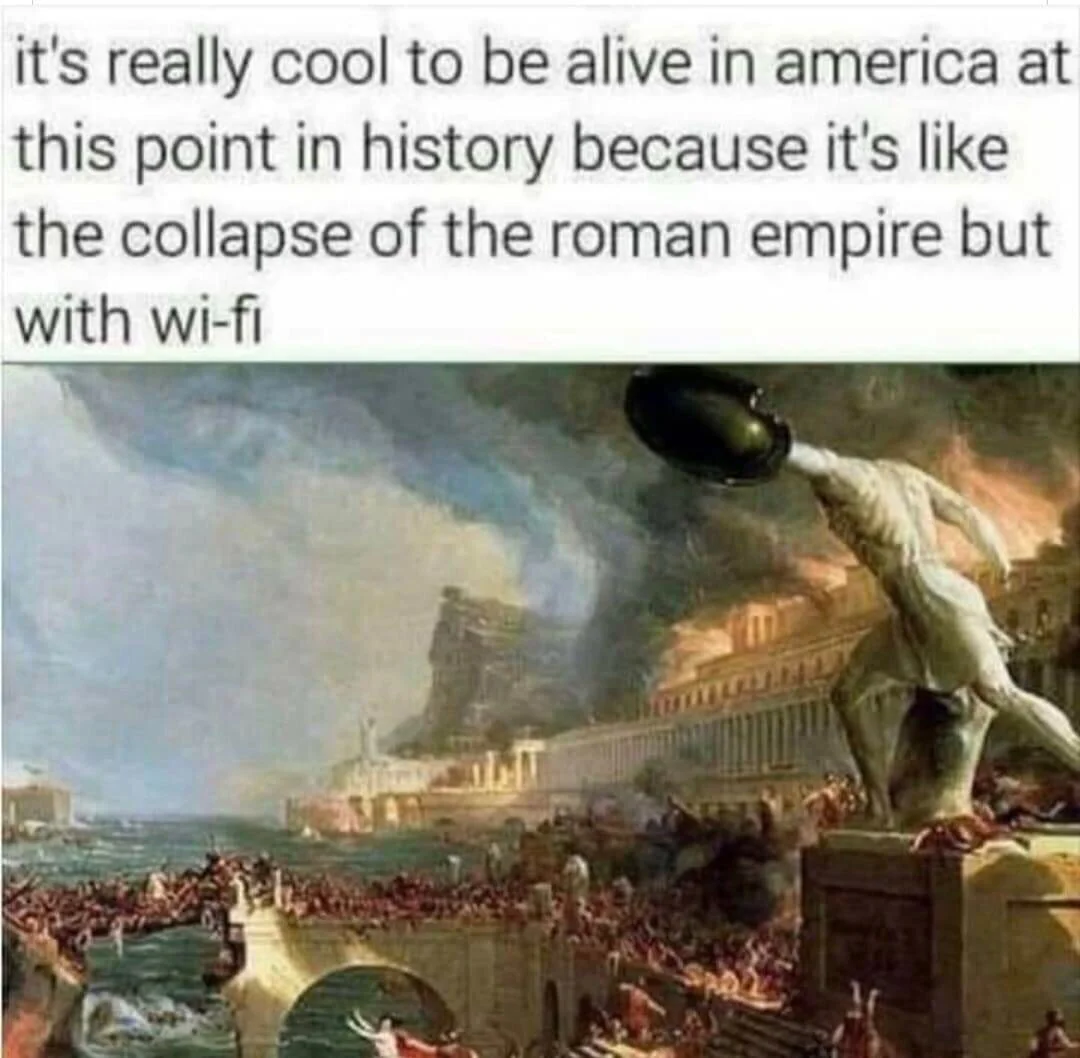Destruction from Thomas Cole’s The Course of Empire, via r/BrandNewSentence
We’re inundated by news and social media. Competing narratives, fake news, and crowded voices on social media all contribute to the confusion about understanding the present and can impact mental health when taken to the extreme. But we still have an insatiable desire to understand what is going on in the world. How can we achieve this?
By looking to the past.
The Lindy Effect is a mechanism used to estimate the life cycle of things. Nassim Taleb’s explanation:
If a book has been in print for forty years, I can expect it to be in print for another forty years. But, and that is the main difference, if it survives another decade, then it will be expected to be in print another fifty years. This, simply, as a rule, tells you why things that have been around for a long time are not “aging” like persons, but “aging” in reverse. Every year that passes without extinction doubles the additional life expectancy. This is an indicator of some robustness. The robustness of an item is proportional to its life!
from Antifragile by Nassim Taleb, page 318
Looking for works of art and literature that have withstood the test of time is a built-in quality control mechanism. You don’t need to wade through junk when selecting well-known 19th-century novels, poems, or symphonies to spend your time on.
Looking through lens of history is also useful in the artistic creation process itself. Brendan Pelsue in his TED talk on why you should read War and Peace:
By the time War and Peace ends, Tolstoy has brought his characters to the year 1820, 36 years before the events he had originally intended to write about. In trying to understand his own times, he had become immersed in the years piled up behind him. The result is a grand interrogation into history, culture, psychology, and the human response to war.
The starting point for Tolstoy’s project eventually became a sprawling epic of the early 19th century, acting as fiction, war documentary, and philosophical meditation. Fictional characters freely intertwine with historical figures in order to zoom in and out of the intimate and large-scale historical currents which informed Tolstoy’s present moment (and ours).
Alan Jacobs likens the act of uncovering insight from past works to stochastic resonance:
When you approach the text from the past on its own terms and for its own sake, it becomes a kind of white noise in relation to present concerns. Your attention to the long ago and far away makes the tumult and the shouting die, the captains and the kings depart. (Allusion alert!) It’s when the current environment lies outside the scope of your attention, when you neither seek nor expect any connection to it, that you make room for random resonances to form.
And when they do form, you begin to discern the really key features of your moment more clearly. An image begins to appear where there had been formlessness. Useless and pernicious statements start to recede into the background as you perceive them for what they are. The salient and the helpful points move to the forefront of your attention.
Whenever you read a time-honored book, it introduces resonances from the past which can help you to understand the present moment. This happens largely by chance, and can give you a viewpoint into the present moment frequently unavailable to those who read current news or social media.
The concept of finding meaning in the past in order to understand the present is nothing new. Marcus Aurelius’ quote from Book 10 of his Meditations is strikingly similar to Eccliastes 1:9 as well as a well-known quote from Battlestar Galactica:
To bear in mind constantly that all of this has happened before. And will happen again—the same plot from beginning to end, the identical staging. Produce them in your mind, as you know them from experience or from history: the court of Hadrian, of Antoninus. The courts of Philip, Aleander, Croesus. All just the same. Only the people different.
from Meditations by Marcus Aurelius, trans. by Gregory Hays, Book 10 p. 139
One of my favorite reading experiences was inexplicably finding a first edition of Wordsworth’s The Prelude in the stacks at the Bowdoin College library one summer. After checking it out, I handled it extremely carefully for two weeks while immersed in the world of Wordsworth’s text in the way that it was originally intended. When I finally returned the copy to the circulation desk (along with a suggestion that they might wish to place that lovely first edition in rare books rather than general circulation), I had discovered a unique reading experience, a fresh understanding of art, nature, and life.
